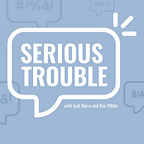Dear listeners,
This is our last episode of 2024! Ken, Sara and I will be off for the holidays and back right after the new year to discuss new messes.
But for this week, we have a look at the substantial settlement that Disney-owned ABC has agreed to pay over George Stephanopoulos’s repeated assertions that Donald Trump had been found “liable for rape” by a jury or juries. The key legal issue here was “substantial truth” — while the E. Jean Carroll jury found Trump had committed sexual abuse but not rape as then defined by New York law, the actions the jury found Trump liable for might well be colloquially described as “rape” in a non-legal context. ABC had tried to get the case thrown out on the grounds that the “rape” statements were substantially true, but Judge Cecilia Altonaga had said that in this instance, substantial truth was a question for a jury to consider — and Disney clearly did not want that question in the hands of a Florida jury, or did not want to be in protracted litigation with the incoming president at a time when the company is, more broadly, trying to extricate itself from hot political disputes.
While ABC had strong defenses available — in addition to substantial truth, it would also have been able to argue that the damage to Trump’s reputation specifically arising from Stephanopoulos’s characterizations was minimal — Trump’s case against the network was not frivolous. That sets the case apart from some others he has filed against CBS (for allegedly editing an interview with Kamala Harris too favorably) and now against pollster Ann Selzer and the Des Moines Register, for publishing a poll that greatly overestimated Harris’s strength in Iowa. Both the CBS and Selzer cases attempt to leverage state consumer protection laws to turn speech Trump dislikes into a tort, and courts have looked very unfavorably on such efforts in the past — though defending the suits will still be a pain.
In New York, Judge Juan Merchan has ruled that the Supreme Court decision establishing a sphere of presidential immunity does not compromise the guilty verdicts Trump faced in his court, for several different reasons, including Trump failing to raise timely objections, the evidence at issue not relating to official presidential acts, and “harmless error” — that even if certain evidence should have been excluded, doing so wouldn’t have changed the jury verdict. Trump will appeal, and meanwhile Merchan will still need to figure out what the hell to do with the case now that Trump is about to be president again.
Meanwhile, Mike Flynn has lost an incompetently-litigated defamation case against Rick Wilson; Blue Cross customer Briana Boston faces criminal charges for telling a customer service representative “you people are next” in an argument over a claim denial; and Ingrid Lewis-Martin, Eric Adams’ longtime right-hand woman, continues to find ways to annoy Ken by not shutting up about her impending criminal charges.
We hope you enjoy the episode,
Josh






